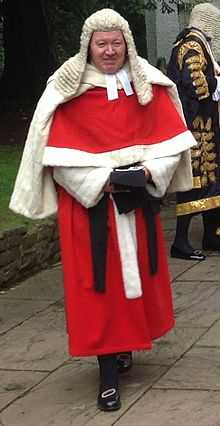John Griffith Williams

Sir John Griffith Williams (born 20 December 1944) is a Welsh judge of the High Court of England and Wales.
Military
Griffith Williams was a lieutenant in the Royal Welch Fusiliers as a member of Territorial Army (United Kingdom), joining in 1964 and becoming part of the Territorial and Army Volunteer Reserve when it was created in 1967. He left the Reserve in 1971.[1]
Legal career
Griffith Williams was called to the bar at Gray's Inn in 1968, was appointed Queen's Counsel in 1985 and elected a bencher in 1994. From 1984 to 2000, he served as a Recorder and as a deputy High Court judge from 1995. From 1990 to 1992, he was a member of the Bar Council. He was treasurer of the Wales and Chester Circuit from 1993 to 1995 and its leader from 1996 to 1998. Griffith Williams was assistant commissioner to the Parliamentary Boundary Commission for Wales from 1994 to 2000. He was appointed a circuit judge in 2000 and was a senior circuit judge and Recorder of Cardiff from 2001 to 2007.[1] On 11 January 2007, Griffith Williams was appointed a Justice of the High Court,[2] receiving the customary knighthood, and assigned to the Queen's Bench Division. He has been a presiding judge of the Wales Circuit since 2010.
April Jones Murder trial
On 29 April 2013, Griffith-Williams oversaw the beginning of the trial which decided the fate of Mark Bridger, who had been accused of murdering Murder of April Jones.[3] The trial lasted just over four weeks, before on 30 May the jury decided that Bridger was guilty of abduction, murder and perverting the course of justice.[4] Griffith-Williams then sentenced him to life imprisonment with a whole-life tariff, also calling him a "pathological liar" and "a paedophile".
Other positions
Since 1999, Williams has been Chancellor of the Diocese of Llandaff, having served as Deputy Chancellor from 1996 until 1990. He served as a fellow of the Woodard Corporation (Western Division) from 1994 to 2002. He was made an honorary fellow of the University of Cardiff in 2008.[1]
References
- ↑ 1.0 1.1 1.2 "Mr Justice Griffith Williams". Debrett's People of Today. Retrieved 13 December 2012.
- ↑ The London Gazette: no. 58222. p. 601. 17 January 2007.
- ↑ Mark Bridger murder trial: court told April Jones was 'happy' to get into car | UK news | The Guardian
- ↑ April Jones trial: Mark Bridger guilty of abduction and murder BBC News, 30 May 2013. Retrieved 30 May 2013.